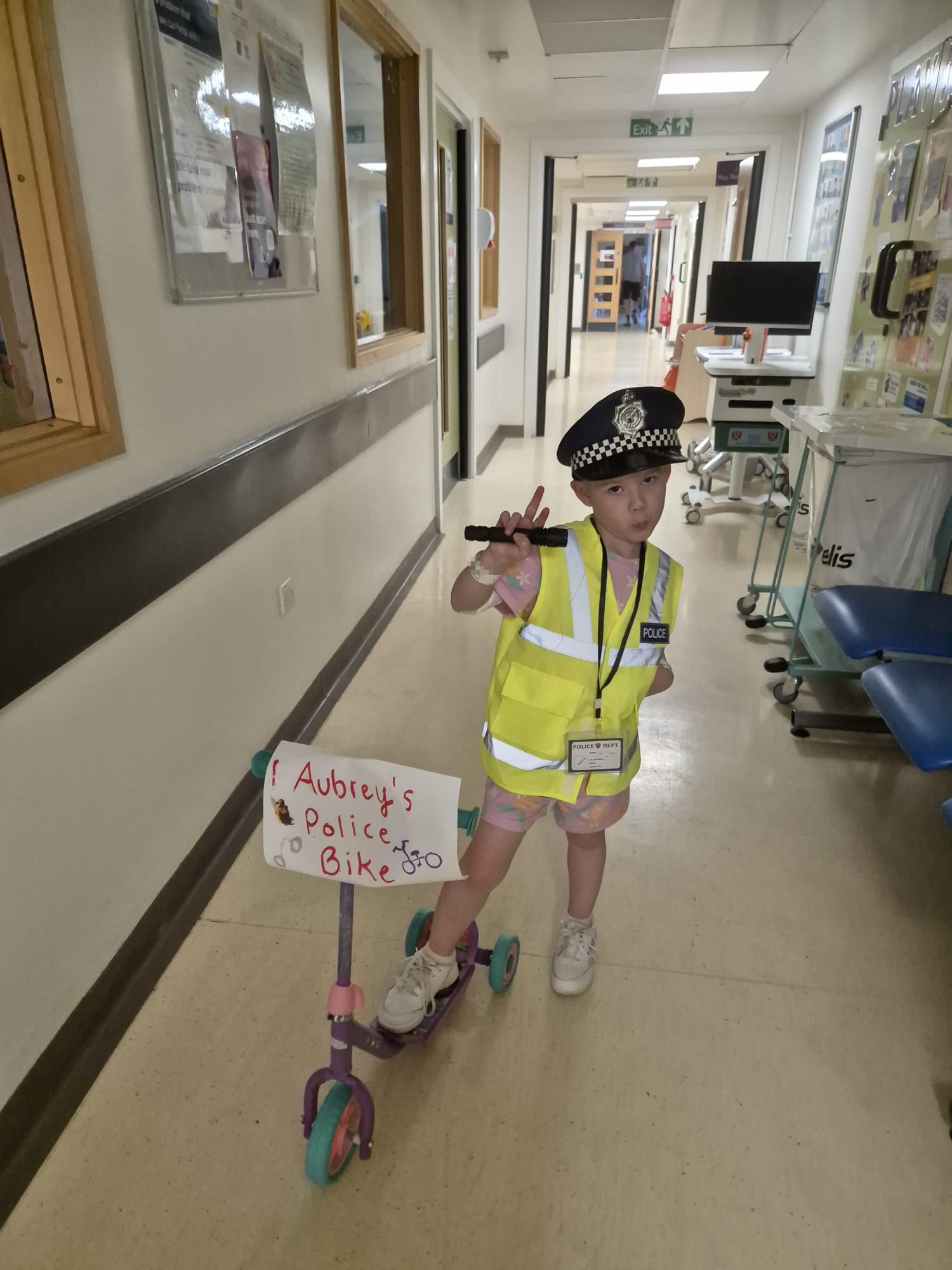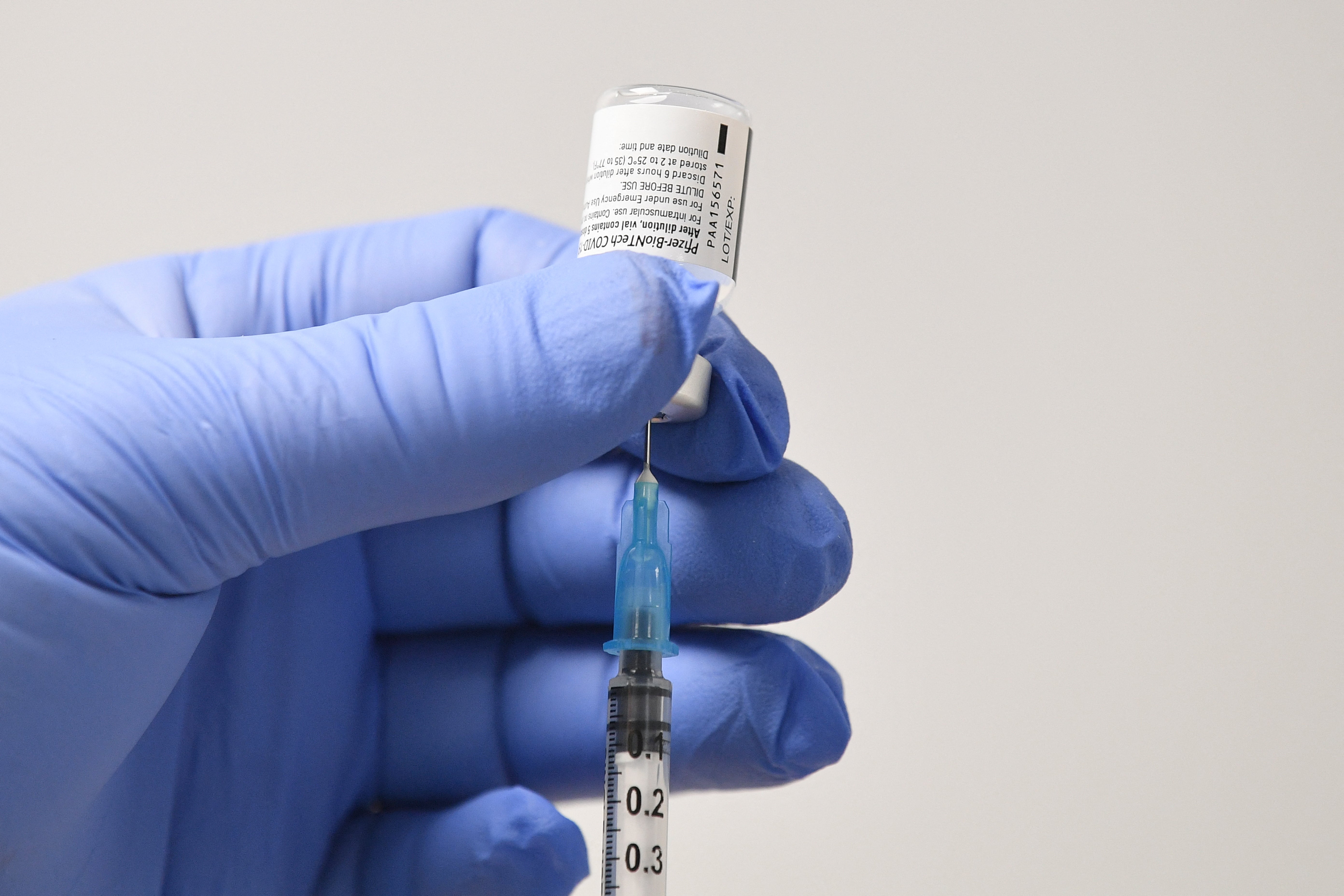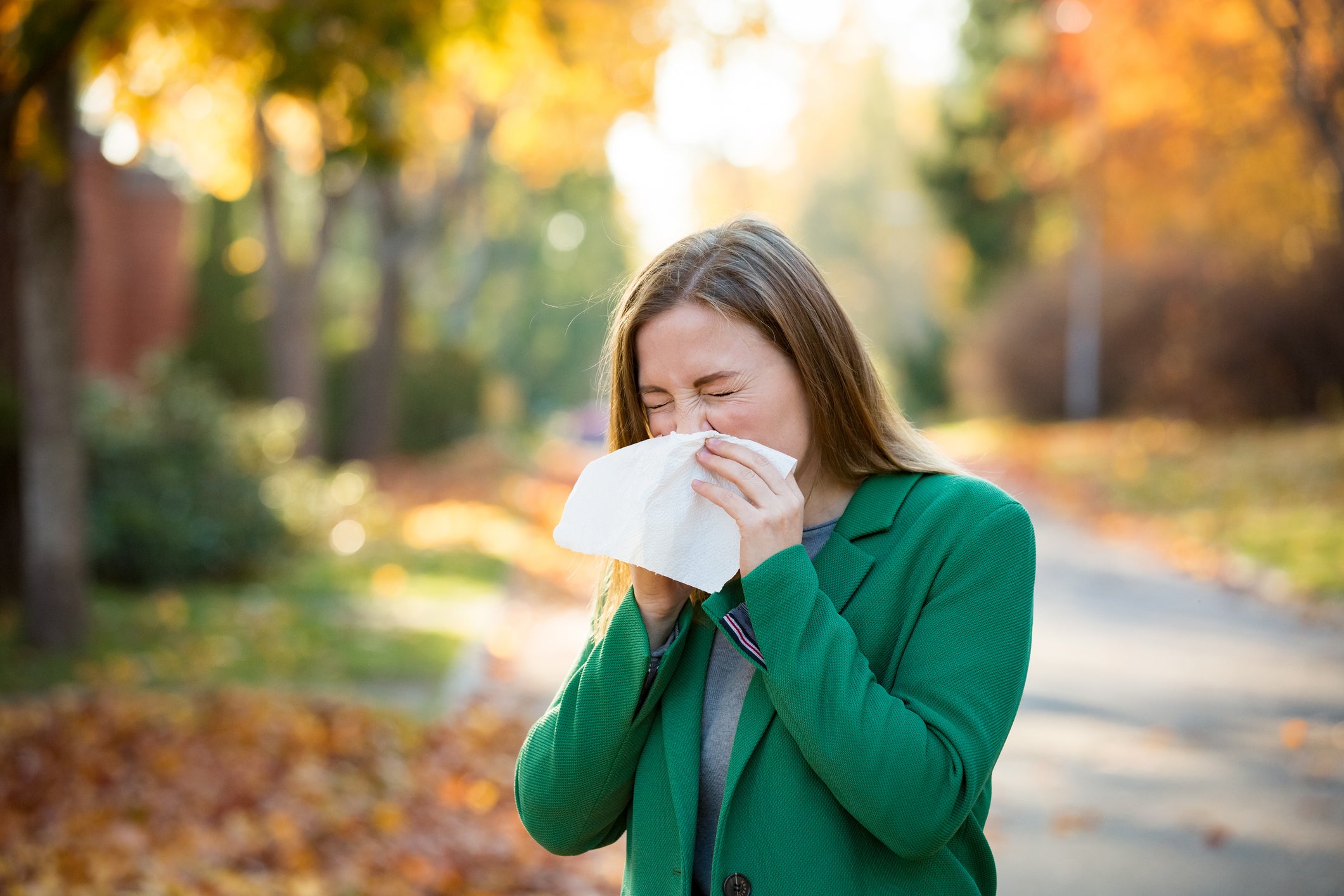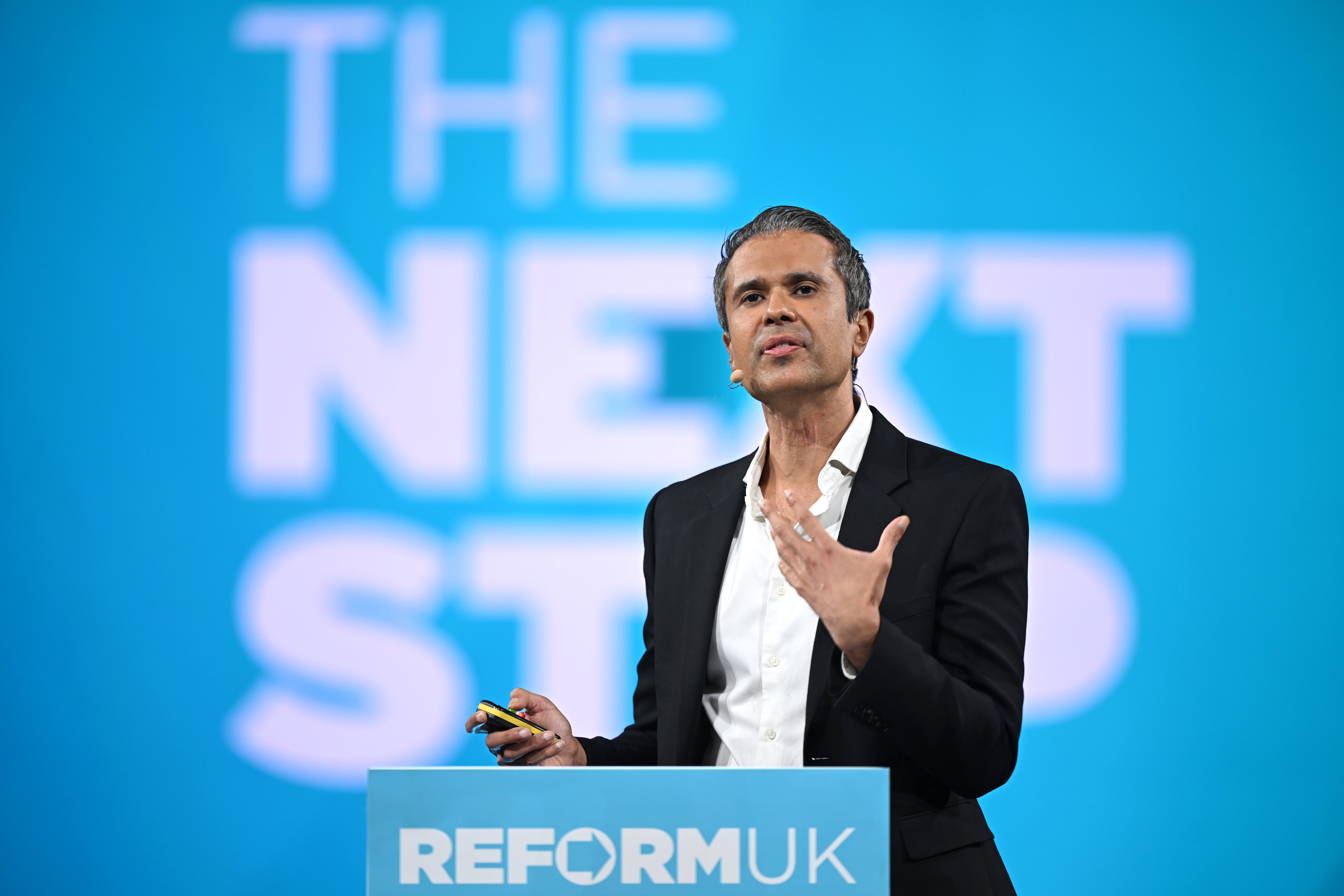

HEALTH
Five-Year-Old’s Rare Leukemia Misdiagnosed as Growing Pains – Shocking Discovery!
Published
1 month agoon
By
OBS
The mother of a five-year-old girl, whose initial symptoms were tragically mistaken for common pains before a heartbreaking turn of events, has spoken of her disbelief after her daughter received a rare cancer diagnosis.
Madeleine Shipp, 28, a stay-at-home mother-of-three from Essex, described how the news “still does not feel real” after her daughter Aubrey, now six, was diagnosed with acute lymphoblastic leukaemia (ALL).
Aubrey first began complaining of leg pain in January, which was initially attributed to growing pains or a pulled muscle from doing the splits at school.
However, the situation escalated dramatically when Aubrey later woke up covered in “spots” and vomited blood, prompting an urgent rush to Broomfield Hospital in Chelmsford.
The five-year-old was subsequently transferred to London’s Great Ormond Street Hospital (GOSH), where specialists confirmed in April that she had ALL, a rare form of cancer affecting the blood and bone marrow.
Since her diagnosis, Aubrey has undergone intensive chemotherapy and immunotherapy, leading her to miss several months of school.
As she approaches the completion of her second round of chemotherapy, Aubrey is eagerly anticipating a gradual return to the classroom and reuniting with her friends.

Her mother, who herself received treatment at GOSH as a baby, expressed profound gratitude, stating she will be “forever grateful” to the hospital for saving both her and her daughter.
“I wouldn’t be here if it wasn’t for GOSH… and Aubrey wouldn’t be here without GOSH,” Ms Shipp said.
“There’s no way she would have been able to survive without every single team working together – Broomfield’s prompt diagnosis and then GOSH supplying all the treatments she needed.
“If there are any other parents going through this, please reach out for help.”
Before her diagnosis, Ms Shipp said Aubrey was a “healthy child” and described her as “the one who never got sick”.
The “sassy” six-year-old loves seeing her friends and going to school – and with her favourite subject being science, she hopes to become a scientist when she grows up.
However, in January, Aubrey started complaining of pain in her left leg.
“You take her to the doctors, it’s pain in her leg, she’s five, so she’s growing, right? We just all thought it was growing pains,” Ms Shipp said.
“She actually did the splits at school, so we also thought she’d pulled a muscle in her leg.”

She was referred to hospital for bloods tests, but Ms Shipp said it was “too early” for her leukaemia to be detected.
“She wasn’t showing any of the other symptoms,” Ms Shipp added.
“Lots of children present with losing weight and feeling tired, being ill, but Aubrey just didn’t have that.”
Symptoms of ALL are not always obvious at first, the NHS says, but can include feeling tired or weak, bleeding or bruising easily, looking pale, swollen glands and a swollen tummy.
In April, Aubrey had a distended stomach and her GP said she had a blockage in her bowel and prescribed laxatives.
A few days later, Aubrey woke up covered “head to toe in spots”, with Ms Shipp believing she had measles – a highly infectious viral illness.
Ms Shipp called NHS 111 for advice and, while she was on the phone, Aubrey started vomiting blood.
“I just hung up and rang 999,” Ms Shipp said.
“The paramedics came out and then we were rushed up to Broomfield Hospital.
“We were lucky with Aubrey’s diagnosis, as a haematology doctor was working that day and took one look at her and said, ‘I think I know what the problem is’.”
At the time, Ms Shipp was pregnant with her third child, and she was asked to call Aubrey’s father, Sammy Brock, to join her at the hospital.

Ms Shipp said she “didn’t think anything of it” at first, but when she and Sammy were called into another room, she knew it was “bad news”.
“They said, ‘I’m really sorry, but she’s got cancer, it’s looking like leukaemia’,” Ms Shipp said.
“They said, ‘We can cure your daughter, but we need to get these infections under control, and we need to transfer her to GOSH because she’ll have the best chance there’.
“I was very sad, very confused, and I started crying and shouting.”
Ms Shipp said Aubrey was “so poorly and so vulnerable” and needed a blood transfusion, antibiotics and multiple cannulas inserted, but she was a “real trooper”.
As her condition worsened, she was intubated and sedated, before being taken to GOSH by ambulance – and Ms Shipp said she was “terrified” her daughter would not make it.
“The whole time I’m thinking, ‘Just hold on till we get there. Just wait till we get there. Please, just don’t go whilst we’re in an ambulance’,” she said.
“I can’t thank that team enough. They were all brilliant.”
After Aubrey was admitted to the paediatric intensive care unit (PICU) at GOSH and had a bone marrow biopsy, her leukaemia diagnosis was confirmed, specifically B cell ALL.
Ms Shipp said Aubrey was “riddled” with infections, meaning she could not start treatment straight away, but the nurses at GOSH sang her Disney songs and plaited her hair to keep her spirits lifted.
The family were supported by the Play team as well, who arranged for Aubrey to play Pokemon hunting games along the corridors, and Ms Shipp was able to stay in GOSH’s family accommodation.

“I don’t think I would have coped as well as I did if it wasn’t for the support up there,” she said.
Aubrey began chemotherapy around a week after her admission to GOSH, which caused her to lose her hair but, aside from complications such as fluid on her lungs, she started responding well to treatment.
She then underwent immunotherapy, which uses the immune system to fight cancer, and was able to return home in May.
Aubrey is approaching the end of her second round of chemo and will soon move on to maintenance treatment, which will last for a year and a half.
She was in the first months of Year 1 when she was diagnosed, and missed a huge part of her first year of school, but she cannot wait to go back.
Ms Shipp said: “We took her to see her Year 2 teacher, and she cried to him, saying, ‘I want to come back now’.
“She loves it, she thrives off school. She’s got all of her friends there and she’s very engaged in lessons.”
Ms Shipp was treated at GOSH when she was a few months old – although she cannot remember her diagnosis – and said she “wouldn’t be here if it wasn’t for GOSH”.

She is determined to raise more awareness of ALL and the “brilliant” teams at GOSH, as they helped to save Aubrey’s life too, and she wants other parents to know “they’re not alone”.
“Sometimes it doesn’t feel real,” Ms Shipp said.
“You don’t think it’s going to happen to you, you don’t think it’s going to happen to your family, you don’t think it’s going to happen to your kids – but it does and it just catches you off guard.
“We are very lucky that we have the NHS in the UK, and we are very lucky that we’ve got hospitals like GOSH that support families as much as they support children.”
Sammy added: “To see Aubrey getting ready to start Year 2 and reunite with her school friends is incredible after everything she’s been through.
“GOSH has been a lifeline for us. The care from the doctors and nurses, and the way the Play team kept her smiling even during the hardest days, is something we’ll never forget.”
To support GOSH Charity’s Build It. Beat It. appeal, which is raising money for a new children’s cancer centre, visit: gosh.org/the-childrens-cancer-centre.
You may like
-
Naira Plummets for the Third Day in a Row: Shocking New Exchange Rate Hits N1,473.29/$!
-


Shocking Recall: Grocery Store Taco Kits Contain Hot Chocolate Packets!
-


Young Republicans Caught in Racist Group Chat Resign Following Shocking Revelations
-


Shocking Arrests: Four Charged in Murder of Osun Local Government Chair – What You Need to Know!
-


Lagos Pushes Back: Shocking Rejection of National Assembly’s Central Gaming Bill!
-


Shocking Revelations: Jonathan’s Fierce Attack on Successor for Neglected Bayelsa Projects!
HEALTH
Can’t Tell If It’s Covid or the Flu? Here Are the Key Symptoms You Must Recognize as Cases Surge!
Published
2 weeks agoon
October 16, 2025By
OBS
Health officials are warning of a seasonal surge in flu and Covid-19, with cases already starting to rise as autumn arrives.
But because the two viruses share many symptoms, it’s difficult to tell them apart.
When a sniffle seems to progress further than “just a cold”, it’s hard to know what it might be – but there are differences in how the viruses appear and the risks they pose.
Do I have Covid?
Covid-19 continues to cause serious illness, particularly among vulnerable groups. The virus is constantly evolving, with new variants spreading easily through coughs, sneezes or even conversation.
Vaccination campaigns each autumn continue to try to prevent hospitalisations and deaths.
The list of symptoms has shifted since 2020. Many people now experience cold-like symptoms, such as a runny nose, sore throat or blocked sinuses. But others still report fever or chills, a persistent cough, fatigue, headaches, shortness of breath, or a loss of taste and smell. Nausea and diarrhoea can also occur.
Doctors say a hoarse throat has become one of the hallmark features of the latest variants.

The latest strain, called Stratus, has two variants, XFG and XFG.3. Another recent strain, NB.1.8.1 nicknamed Nimbus, is also prevalent.
“Stratus is linked to hoarseness and fatigue, whereas Nimbus is associated with a ‘razor-blade’ sore throat and digestive symptoms like nausea and bloating,” explains Dr Bruno Silvester Lopes, lecturer in microbiology at Teesside University. “Both are highly transmissible but not more severe than previous variants.”
Despite accounting for a large proportion of new cases, experts are not concerned about the spread, noting it is normal for viruses to mutate and change.
Those aged 65 and over, care home residents, and people with underlying health problems are all entitled to the Covid-19 booster.
Do I have the flu?
Flu is a respiratory infection that strikes hardest in winter and can be far more debilitating than the common cold. While colds typically bring a runny nose, sneezing, watery eyes and mild throat irritation, flu tends to arrive suddenly with fever, aches and exhaustion.
Last winter alone, the flu sent more than 8,000 people to hospital. Over the past two years, at least 18,000 deaths in the UK have been linked to the virus. Children, older adults, people with long-term health problems and those with weakened immune systems face the highest risks.

Vaccination remains the strongest defence. Research shows that last year’s jab prevented thousands of severe cases, cutting hospital admissions by almost a third among over-65s and by more than half among children aged two to 17.
This autumn, the flu vaccine is being offered free to those over 75, pregnant women, children aged 2 and 3 through their GP, and schoolchildren from reception to year 11 via nasal spray. Adults under 65 with certain health conditions are also eligible.
How to tell difference between Covid and a cold
Colds and Covid can be tricky to distinguish as many of their symptoms overlap.
“Both can give you a sore throat, runny or stuffy nose, sneezing, and coughing,” says Dr Chun Tang, a GP at Pall Mall Medical. “However, Covid can also cause fever, fatigue, muscle aches, and that telltale loss of taste or smell – although that’s less common with newer variants.
“Covid is also more likely to make you feel wiped out, like you’ve been hit by a truck, whereas a cold tends to stay in your head and chest.”
“Both spread mainly through droplets when someone coughs, sneezes, or even talks near you,” says Tang. “Covid, however, can also spread more easily through the air in tiny particles that linger, especially in crowded or poorly ventilated spaces.
“So, while a cold might need a bit of close contact to catch, Covid can sometimes sneak across the room if you’re unlucky.”
Are cases climbing now?
According to the UK Health Security Agency, levels of flu and Covid-19 are already on the rise running into winter, joining other seasonal bugs such as RSV and norovirus.
UKHSA reported an increase in the number of reported Covid diagnoses in its 9 October report, with the most prevalent strain noted as Stratus XFG. Flu activity was also increasing among young adults with a surge in emergency department attendances for flu-like illnesses.
Experts say the risk is highest during the colder months when viruses spread more easily indoors.
Officials are urging everyone eligible to take up their vaccines to reduce the strain on hospitals and protect the most vulnerable. Both flu and Covid-19 can be serious, but prevention and early awareness remain the best tools against them.
HEALTH
Shocking Recall: Grocery Store Taco Kits Contain Hot Chocolate Packets!
Published
2 weeks agoon
October 16, 2025By
OBS
The Giant Company is recalling its Giant and Martin’s-branded hard taco dinner kits after hot chocolate sachets were discovered inside the packages.
The mix-up, announced October 10, could pose a risk to consumers with milk allergies.
The recall affects the 9.4-ounce Giant/Martin’s Hard Taco Dinner Kit (UPC 068826757516) all lot and codes, with a best-by date of March 13, 2026.
Consumers with a milk allergy should not eat the kits. Anyone who purchased the affected product can return it to a nearby store with a receipt to receive a refund.
Milk allergy is a common food allergy in children, caused by cow’s milk or milk from other mammals, according to Mayo Clinic.
.jpg)
Reactions can occur soon after consumption and range from mild symptoms like hives, vomiting, and digestive issues to severe, life-threatening anaphylaxis.
The main treatment is avoiding milk and milk products. Most children outgrow the allergy, while others may need to avoid milk long-term.
Meanwhile, Sno Pac Foods, a Minnesota-based company, has issued a nationwide recall of its frozen spinach products due to potential contamination with Listeria monocytogenes, a bacterium that can cause serious infections.
The recall affects two products: Del Mar 35-pound Bulk Organic Frozen Spinach and Sno Pac 10-ounce Organic Frozen Cut Spinach. These products were distributed across various retail stores in the U.S. The recall was prompted after a bulk case of spinach from a supplier tested positive for the bacterium.
This same lot was used to repack the Sno Pac Organic Frozen Cut Spinach into 10-ounce bags. As a precaution, Sno Pac Foods has suspended production of these products while investigating the source of the contamination.
No illnesses have been reported in connection with the recalled products. However, Listeria monocytogenes poses a significant health risk, particularly to young children, the elderly, pregnant women, and individuals with weakened immune systems.
In healthy individuals, infection may cause short-term symptoms such as high fever, severe headache, stiffness, nausea, abdominal pain, and diarrhea. Pregnant women are especially vulnerable, as infection can lead to miscarriage or stillbirth.
HEALTH
Could Trump’s Meds Be Slowing Him Down? Expert Warns They Might Not Be Helping!
Published
2 weeks agoon
October 16, 2025By
OBS
An adviser to Health Secretary Robert F. Kennedy Jr. warned Wednesday that President Donald Trump may appear to be “slowing down” because of the medication he takes, as questions continue over the president’s mental and physical health.
In a speech to the European Parliament, Dr. Aseem Malhotra, a British cardiologist who advised the lobby group Make America Healthy Again, said that Trump, 79, may be suffering from fatigue due to his use of cholesterol medications, or statins, and aspirin.
“President Trump is taking statins; he’s on two cholesterol drugs… This man does not have any cardiovascular disease,” Malhotra said during a launch event for a new European health activism organization, Make Europe Healthy Again (MEHA).
“If you’re over 75 and have no cardiovascular disease, the benefit of statin is – are you ready? One in 446. You have to give the statin to 446 people to prevent one cardiovascular event,” he said. “In other words, no significant benefit.”
Malhotra, a vaccine skeptic whose anti-COVID shot and anti-statin views have been rebuked as misinformation by medical experts, has been a close ally to Kennedy.

His comments come amid claims that the president may be showing signs of “cognitive decline,” due to mixing up names and other gaffes. Despite the speculation, the White House said last week that Trump was in “excellent overall health” following a “routine check-up” at Walter Reed Medical Center.
In addition to concerns about his mental acuity, Trump’s physical health has also come under question. The president has often been photographed with bruising on his right hand, raising concerns that he is suffering from some illness. The White House insists that this is a result of him shaking hands with a large number of people and his use of aspirin, which he takes as a cardiovascular protection.
White House officials revealed earlier this year that he had been diagnosed with chronic venous insufficiency, a non-life-threatening condition caused by the veins struggling to return blood to the heart. The condition is common for people over the age of 70.
During his remarks, Malhotra noted that cholesterol medication often comes with side effects, saying: “The most common ones are fatigue, muscle pain. It can cause brain fog.”
He added: “Now, I know that President Trump is a remarkable man for his age, but there have been reports – probably exaggerated by some sort of devious press for sure. But I know people who are close to him… and of course he is doing a tremendous job and maybe only sleeping four hours a night, and that may be part of it too, but it could also be that he’s slowing down a little bit because of his statins,” he continued.

Malhotra then suggested that Trump go “off his statins, off his aspirin” and would be “feeling great” within a matter of weeks.
He was apparently so concerned about Trump taking the medications that he has reached out to several people close to the president to try and warn him against it, The Daily Beast reported Tuesday ahead of Malhotra’s public remarks.
In a statement to The Independent, the White House said: “President Trump is a champion-level golfer with the mental acuity and energy levels that most young people could not fathom having.”
“So-called medical ‘experts’, especially foreign ones with no relevance or involvement with the Administration, should stop beclowning themselves and marring their credibility by pitching their idiotic hot takes with Fake News outlets that have nothing better to cover,” White House spokesman Kush Desai said.

Along with Trump’s most recent gleaming health report, White House officials noted the president received a flu shot and an updated COVID-19 booster, which Malhotra called unnecessary.
“I think President Trump, I think he genuinely took the [COVID-19] booster, I don’t think that this is a front. I think he believes in what’s happening. He himself is also a victim of medical misinformation,” Malhotra said.
However, recent research shows that COVID shots protect against serious illness and death, especially for people over the age of 65. Researchers from the VA St. Louis Healthcare System looked at data from nearly 300,000 veterans and found that last season’s Covid vaccine reduced the risk of emergency room visits by 29 percent, hospitalizations by 39 percent and deaths by 64 percent for all ages, NBC News reports.
Combining all three outcomes, the shots’ overall effectiveness was 28 percent, making it similar to the flu shot, which ranges from 30 to 60 percent protective against severe illness or death.
An April health report also noted that Trump, who was the oldest person to ever take office in January at 78, was in “excellent” health.
The report also noted that Trump had high cholesterol that was being treated with the statin rosuvastatin and ezetimibe, a medication used to absorb cholesterol. He was also taking a low-dose aspirin as part of the treatment, his doctors said at the time.
While there is no evidence that statins alone cause dementia, the FDA added a safety warning to the medications in 2012 to warn of “notable, but ill-defined memory loss or impairment that was reversible upon discontinuation of statin therapy.”
Last month, Malhotra made headlines after suggesting – without evidence – that King Charles III may have gotten cancer because of the COVID-19 vaccine.
Categories
Top Tags
Related posts






















